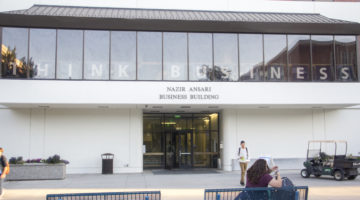
Maddison Cervantes/Nevada Sagebrush
Julian Sander spends his weekend back home in Auburn, California constructing his next batch of Wasted Eyewear sunglasses. He purchased the necessary machinery through his winnings from the Sontag Entrepreneurial Competition 2014.
By Maddison Cervantes
Dressed in a flannel shirt and a ragged pair of jeans, freshman Julian Sander stood atop a stage in the Joe Crowley Student Union attempting to win over an audience full of Ph.Ds and graduate students. Although Sander’s casual appearance and relaxed attitude may have drawn skepticism, his thought-provoking business proposal proved laudable.
Sander would go on to become a finalist in the University of Nevada, Reno’s fourth annual Sontag Entrepreneurial Competition in March, despite not originally entering.
“The other businesses were very advanced, and a lot more complicated than mine,” Sander said. “Honestly, I wasn’t showing up to win, I just wanted to see what it was all about.”
Shortly after his arrival at UNR, Sander found himself to be the youngest applicant and first place winner of the Sontag competition’s beginning portion, the Pack Pitch night, where each business plan is pitched to the judges.
Upon his two-minute-long business proposal, Wasted Eyewear was established – Sander’s company that recycles worn-out or broken snowboards and skateboards to produce handmade sunglasses.
“I literally heard about the competition the day before and signed up for it that night,” Sander said. “I was like ‘screw it, I might as well show up and pitch my idea.’”
Sander’s first place idea flipped a switch in his head years ago, when he had gotten tired of hoarding the many skateboards and snowboards he had broken throughout his reckless adventures in his hometown of Auburn, California.
Sander thought, ‘Why not create something new out of the thrashed wood from the boards, instead of allowing them to collect dust?’
While Sander is constantly developing new ideas, he has acquired a specific taste for originality. Despite this entrepreneurial outlook, money has never been important to Sander.
“My whole thing with money is that I don’t really need it,” Sander said. “I’m not out to make millions, I just want to support myself doing something that I enjoy, and Sontag is teaching me how do that.”
The Sontag competition enabled Sander to take an idea and create a company out of it through the judges’ feedback and the assistance of his mentor.
Immediately following his business proposal, Sander was tracked down by Matt Westfield, the founder and director of Entrepreneurs Assembly, a corporation dedicated to guiding young entrepreneurs toward success. He immediately became interested in Sander’s business, and wanted to mentor him for the competition – all participants are required to have one.
“I was drawn to Julian because he’s real, he doesn’t care about money, he actually wants to start a business,” Westfield said. “He has his eyes on the prize and that’s why he won.”
Westfield explained that when Sander went up against Ph.Ds and graduate students, considering his young age and minimal experience, he raised the bar for the competition through his eloquent proposal.
“[Sander] doesn’t care what he doesn’t know,” Westfield said. “He has an uncanny ability that most people can’t find in a lifetime.”
Sander took second place in the Sontag Entrepreneurial Competition 2014, and received $6,500, but he is interested in heightening his knowledge. Sander will be participating in this year’s Sontag competition as a sophomore.
As he was a finalist this past year, he cannot enter the competition with the same business twice, but that has not discouraged Sander.
He has already generated a new idea – Thrashed Lids, a company that recycles fabric from floral print shirts, and creates five panel hats out of it. Sander explained that he is not competing in Sontag for the success of one specific business, such as Wasted Eyewear, but for the expertise the competition offers.
Krysta Jackson, assistant director of the Sontag Entrepreneurship Competition, worked with Sander this past year during the competition, and continues to be impressed by his diligence.
“We have never had anyone apply in their first semester, and he really understood his market better than some of his competitors,” Jackson said.
Sander said that he wishes to continue participating in Sontag for the knowledge that the minds behind the competition provide him. Once again, the money is not the goal for Sander; it is the feedback he picks up along the way.
“Sontag is the reason I have this network of people in Reno now,” Sander said. “They all think I’m this business guru but really I’ve just been learning as I go and it’s been working out.”
Sander sees knowledge as the foundation of business, and he is eager to continue learning. While looking to become as involved as possible, The Nevada Governor’s Cup is another business plan competition that Sander will be competing in later this year.
During his downtime between competitions, Sander is contracting work on the laser cutter he purchased with his winnings from Sontag. He has taken up custom engraving as a side business and creates large orders of key chains for snowboard and skateboard brands such as Smokin’ Snowboards from Reno and Green Bandit Productions from Truckee, California.
With the experience he will gain from this year’s Sontag competition and the Governor’s Cup, Sander will continue equipping himself with the correct skill set necessary to move forward with his entrepreneurial future.
Sander’s goals for the future are to move forward with Wasted Eyewear, or a new company that satisfies his inventive taste. Sander will settle for either groundbreaking or unemployment. He will certainly not be found behind a desk, bound by a cubicle.
“I am either going to be a millionaire, or I am going to be homeless, and I am going to be happy either way,” Sander said. “I’ve just always known that I have to make a living doing something cool.”
Maddison Cervantes can be reached at mcervantes@sagebrush.unr.edu.










